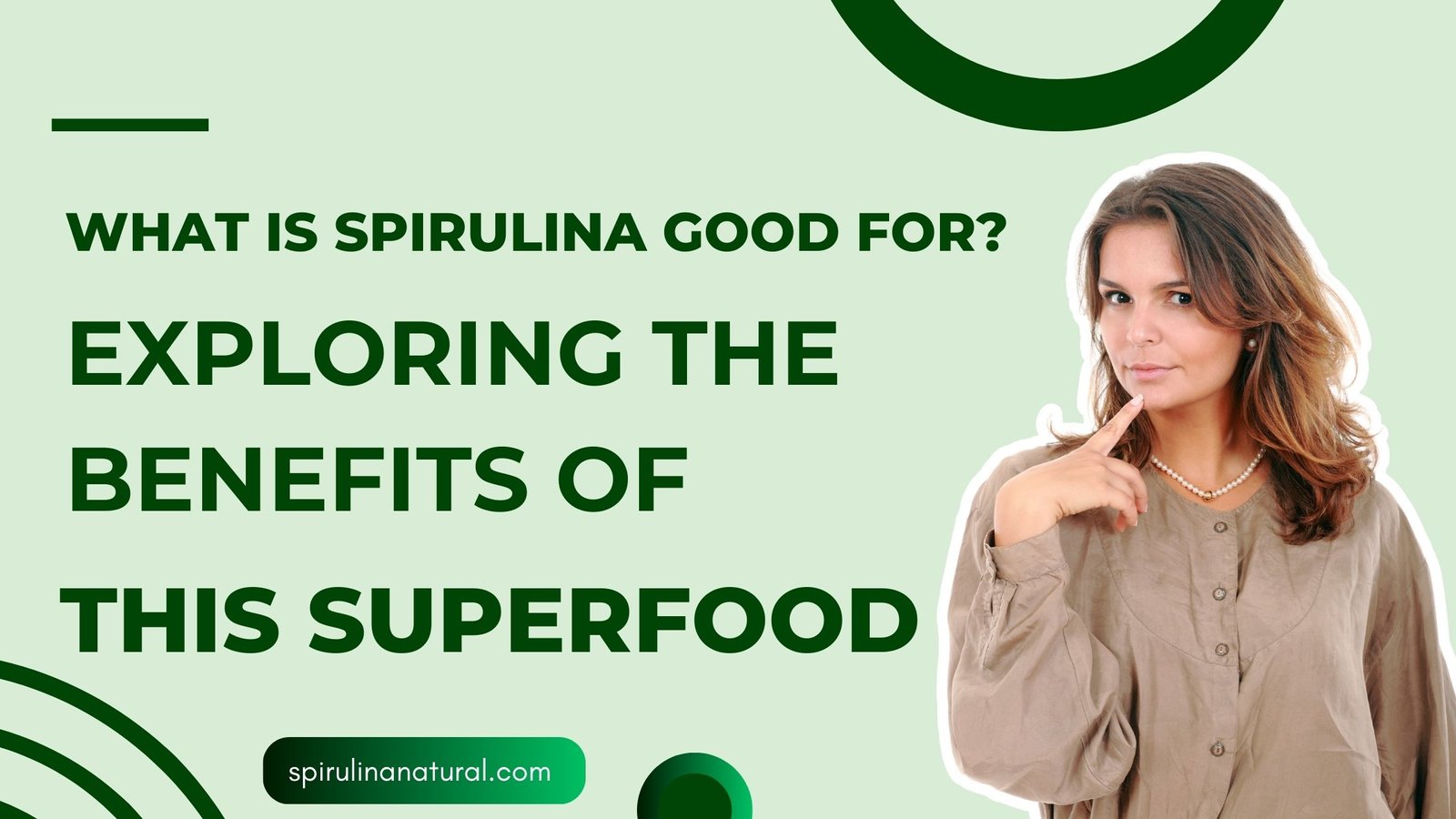Spirulina, a nutrient-rich blue-green algae renowned for its exceptional nutritional profile and myriad health benefits, has risen to prominence as a superfood in contemporary times. This natural wonder has been cherished across centuries by diverse global cultures for its dense concentration of essential nutrients and therapeutic attributes. Its rich reservoir of vitamins, minerals, antioxidants, and high-quality proteins not only underscores its nutritional prowess but also highlights its potential in promoting holistic health and well-being. Let’s delve deeper into the distinctive qualities that make spirulina such a valuable addition to dietary regimens and explore its multifaceted contributions to enhancing overall health and vitality.
Nutritional Composition of Spirulina

Spirulina earns its reputation as a nutritional powerhouse owing to its dense concentration of crucial vitamins, minerals, and a variety of essential nutrients essential for optimal health. This superfood distinguishes itself with an abundant supply of :
- Protein : Spirulina is known for its high protein content, making it a valuable source of plant-based protein for vegetarians and vegans. It supplies the body with all essential amino acids crucial for its proper functioning.
- Vitamins : It is a good source of vitamins B1 (thiamine), B2 (riboflavin), B3 (niacin), B6 (pyridoxine), and B9 (folate). These vitamins are essential for functions such as energy metabolism, nervous system function, and cellular health.
- Minerals : Spirulina contains significant amounts of iron, magnesium, potassium, and calcium, which are essential for various bodily functions including blood health, muscle function, and bone strength.
- Antioxidants : It is rich in antioxidants like beta-carotene, zeaxanthin, and phycocyanin. These substances assist in fighting oxidative stress and shielding cells against harm caused by free radicals.
Health Benefits of Spirulina
1. Supports Immune Function

The immune-boosting properties of spirulina are attributed to its high antioxidant content and its capability to enhance the activity of immune cells. Consequently, by reducing oxidative stress and inflammation, it supports a robust immune response, aiding the body in defending against infections and illnesses.
2. Improves Energy Levels

Due to its rich iron content and high protein bioavailability, it can help improve energy levels and combat fatigue. Iron plays a crucial role in transporting oxygen through the bloodstream and facilitating energy production within cells, which highlights spirulina as a natural source of energy enhancement.
3. Promotes Heart Health

Research suggests that spirulina may lower cholesterol and blood pressure, common risk factors for heart disease. Moreover, its antioxidants and anti-inflammatory properties support cardiovascular health by reducing artery plaque and enhancing blood vessel function.
4. Supports Detoxification

The distinctive composition of spirulina aids in facilitating detoxification processes within the body. It binds to heavy metals and toxins, aiding their elimination from the bloodstream and organs. Regular consumption of spirulina may assist in maintaining liver health and promoting overall detoxification.
5. Enhances Muscle Strength and Endurance

Athletes and fitness enthusiasts frequently rely on spirulina to enhance muscle strength and endurance. Additionally, its high protein content and antioxidant support help reduce exercise-induced muscle damage and inflammation, leading to quicker recovery times and improved athletic performance.
6. Supports Weight Management

As a low-calorie, nutrient-dense food, spirulina can be beneficial for weight management. The protein and fiber content help promote satiety, reducing cravings and overall calorie intake. Additionally, its ability to support energy metabolism and reduce oxidative stress may contribute to maintaining a healthy weight.
7. Promotes Mental Clarity and Mood Balance
The presence of amino acids like tryptophan in spirulina supports the production of neurotransmitters such as serotonin, which plays a crucial role in mood regulation and mental well-being. Regular consumption of spirulina may help improve mood, reduce anxiety, and enhance cognitive function.
How to Incorporate Spirulina into Your Diet

Integrating spirulina into your daily dietary regimen can be both simple and beneficial, offering numerous convenient options to suit various tastes and preferences:
1. Smoothies
Enhance the nutritional content of your fruit or vegetable smoothies by incorporating spirulina powder. This quick and easy method not only adds a potent dose of essential nutrients but also blends seamlessly with a variety of flavors, providing a refreshing and nutrient-packed boost to to kickstart your morning or recharge post-workout.
2. Salads and Soups
Elevate the nutritional value of salads or soups by sprinkling spirulina flakes or powder over them. This method not only enhances the visual appeal of your dishes but also infuses them with the beneficial properties of it, such as its high protein content, vitamins, and minerals. Whether tossed into a crisp garden salad or stirred into a hearty soup, spirulina adds a subtle yet impactful nutritional punch.
3. Snacks
Incorporating spirulina into homemade snacks, energy bars, or granola mixes offers a wholesome and nutritious alternative to conventional treats. By blending it into your favorite snack recipes, you can create delicious and satisfying treats that are rich in protein, fiber, and antioxidants. This makes snacking not only enjoyable but also contributes to maintaining energy levels and supporting overall health.
4. Capsules or Tablets
For those who prefer a more convenient approach, spirulina is readily available in capsule or tablet form. Consequently, this makes it effortless to incorporate into your daily routine as a dietary supplement, ensuring a consistent intake of spirulina’s valuable nutrients without needing to change your eating habits. Capsules or tablets provide a convenient option for busy lifestyles or when traveling, ensuring that you can reap the benefits of spirulina’s nutritional profile wherever you go.
By exploring these versatile methods of incorporating spirulina, you can align consumption with your lifestyle and nutritional goals. Whether in smoothies, dishes, snacks, or capsules, this superfood offers flexible ways to support health with its rich nutrients and antioxidants.
Precautions and Considerations
Although spirulina is generally safe in recommended doses, those with health conditions or allergies should use it cautiously. Consult a healthcare provider before starting any new supplement, especially if pregnant, nursing, or on medication. This proactive approach ensures personalized advice and safe integration of spirulina into one’s health routine.
Read Also : Can Spirulina Help You Lose Weight?
Conclusion
In summary, spirulina stands out as a nutrient-dense superfood with a diverse array of potential health benefits. Incorporating spirulina regularly enhances immune function, heart health, energy levels, and weight management, providing crucial nutritional support. Its potent nutrients and antioxidants optimize health and vitality, whether in smoothies, salads, or as a supplement, making spirulina a versatile addition to a healthy lifestyle.







